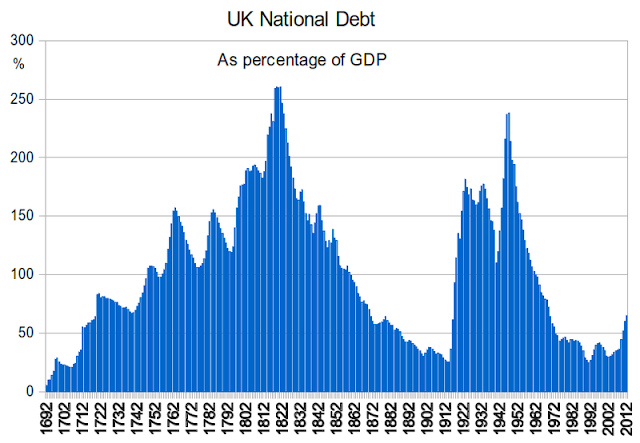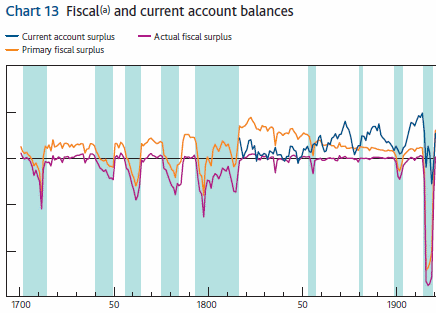I was watching Bloggingheads.tv, where Mark Blyth noted that contra Rogoff and Reinhart, Great Britain had a very high debt/gdp ratio at the beginning of the 19th century and then proceeded to have one of the best centuries of absolute growth in the history of civilization. Thus, debt is, if anything, salutary at really high levels, so the government should run higher deficits, etc. I've heard this argument quite a bit. See this chart from Wikipedia:
It peaks after the Napoleonic wars at 250%, well above the 90% number everyone has been talking about in the US. Note the clear decline in debt from Waterloo to World War 1. This is because the government started to perpetually run a surplus (see chart below, taken from here). 
After the big wars, they would run surpluses regardless of the business cycle. So, was the prosperity from 1815-1914 caused by the debt in 1815, or the subsequent surpluses? Given the debt was used to make war, I don't think we can say it funded the public goods like roads that then generated 1000% returns.
I like Kevin Williamson's argument that the US is bound to default, and that's a good thing. Increasing the state doesn't create prosperity, rather, it first takes people out of the productive sector, then increases resentment because people given housing vouchers or make-work jobs know they are low status, undeserving relative to a billion other souls in the world. Better to let people find their way by getting out of the way.
- English (UK)
- English (India)
- English (Canada)
- English (Australia)
- English (South Africa)
- English (Philippines)
- English (Nigeria)
- Deutsch
- Español (España)
- Español (México)
- Français
- Italiano
- Nederlands
- Português (Portugal)
- Polski
- Português (Brasil)
- Русский
- Türkçe
- العربية
- Ελληνικά
- Svenska
- Suomi
- עברית
- 日本語
- 한국어
- 简体中文
- 繁體中文
- Bahasa Indonesia
- Bahasa Melayu
- ไทย
- Tiếng Việt
- हिंदी
UK Austerity In The 19th Century: High Debt, Absolute Growth
Published 06/17/2013, 02:25 AM
Updated 07/09/2023, 06:31 AM
UK Austerity In The 19th Century: High Debt, Absolute Growth
Latest comments
Install Our App
Risk Disclosure: Trading in financial instruments and/or cryptocurrencies involves high risks including the risk of losing some, or all, of your investment amount, and may not be suitable for all investors. Prices of cryptocurrencies are extremely volatile and may be affected by external factors such as financial, regulatory or political events. Trading on margin increases the financial risks.
Before deciding to trade in financial instrument or cryptocurrencies you should be fully informed of the risks and costs associated with trading the financial markets, carefully consider your investment objectives, level of experience, and risk appetite, and seek professional advice where needed.
Fusion Media would like to remind you that the data contained in this website is not necessarily real-time nor accurate. The data and prices on the website are not necessarily provided by any market or exchange, but may be provided by market makers, and so prices may not be accurate and may differ from the actual price at any given market, meaning prices are indicative and not appropriate for trading purposes. Fusion Media and any provider of the data contained in this website will not accept liability for any loss or damage as a result of your trading, or your reliance on the information contained within this website.
It is prohibited to use, store, reproduce, display, modify, transmit or distribute the data contained in this website without the explicit prior written permission of Fusion Media and/or the data provider. All intellectual property rights are reserved by the providers and/or the exchange providing the data contained in this website.
Fusion Media may be compensated by the advertisers that appear on the website, based on your interaction with the advertisements or advertisers.
Before deciding to trade in financial instrument or cryptocurrencies you should be fully informed of the risks and costs associated with trading the financial markets, carefully consider your investment objectives, level of experience, and risk appetite, and seek professional advice where needed.
Fusion Media would like to remind you that the data contained in this website is not necessarily real-time nor accurate. The data and prices on the website are not necessarily provided by any market or exchange, but may be provided by market makers, and so prices may not be accurate and may differ from the actual price at any given market, meaning prices are indicative and not appropriate for trading purposes. Fusion Media and any provider of the data contained in this website will not accept liability for any loss or damage as a result of your trading, or your reliance on the information contained within this website.
It is prohibited to use, store, reproduce, display, modify, transmit or distribute the data contained in this website without the explicit prior written permission of Fusion Media and/or the data provider. All intellectual property rights are reserved by the providers and/or the exchange providing the data contained in this website.
Fusion Media may be compensated by the advertisers that appear on the website, based on your interaction with the advertisements or advertisers.
© 2007-2024 - Fusion Media Limited. All Rights Reserved.
